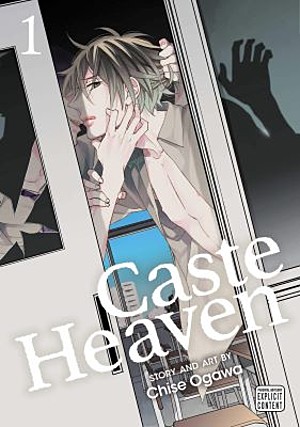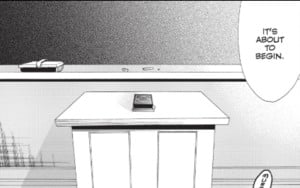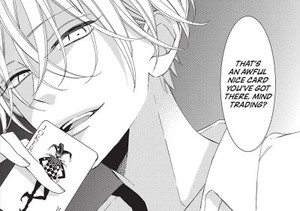The Spring 2020 Manga Guide
Caste Heaven
What's It About?
 School can be difficult at the best of times. But it's especially difficult for Class 2-1, where Castes are everything. A sick card game is played. You go searching, and depending on which card you find, you are given a rank. If you are the king, everyone bows to you. If you are the Joker, however, you are the Target. People are permitted to do whatever they'd like to you, to bully you and vent their anger at their whim. Azusa is the current king. Everybody does exactly as he says. Everyone is his friend. Except, in the most recent version of the game, he has lost his status. He is now the Target, and a person who used to be below him, his dutiful servant, now lords over him. Azusa is about to learn what life at the bottom is like—except he already knew. His home life is hard, and school was his only refuge, his only place of power. But know that even that is gone, it seems Azusa's life is about to get a lot harder.
School can be difficult at the best of times. But it's especially difficult for Class 2-1, where Castes are everything. A sick card game is played. You go searching, and depending on which card you find, you are given a rank. If you are the king, everyone bows to you. If you are the Joker, however, you are the Target. People are permitted to do whatever they'd like to you, to bully you and vent their anger at their whim. Azusa is the current king. Everybody does exactly as he says. Everyone is his friend. Except, in the most recent version of the game, he has lost his status. He is now the Target, and a person who used to be below him, his dutiful servant, now lords over him. Azusa is about to learn what life at the bottom is like—except he already knew. His home life is hard, and school was his only refuge, his only place of power. But know that even that is gone, it seems Azusa's life is about to get a lot harder.Caste Heaven is an original manga series by Chise Ogawa. It is published by SuBLime and retails for $6.29 digitally and $12.99 physically. The series has been adapted into Drama CDs and a phone game.
Is It Worth Reading?

Faye Hopper
Rating:
I don't want to write about Caste Heaven. I'd just be repeating so many points I've made about other books during guides since time immemorial: it's gross, it tries to frame situations where consent is dubious as titillating, its idea of what romance is perverse and disgusting. Having to review this kind of material can be so exhausting.
But is Caste Heaven? It's a Boys Love manga, like many other Boys Love manga, in that it is about power. What people do when they are given power, what happens when people do not have power and are subject to its temperamental whims. It is about a young boy with a bad home life who finds an outlet for his pain in a sick class game his school plays, and how he reacts when even that is ripped from him. It is about the abuse he inflicts on others, and the abuse others inflict on him. But it is meant to be, on some level, fun. It is a manga where sex is featured prominently, where male forms are lovingly detailed, and where the appeal is lascivious in nature. Do those descriptions sound fun? Does that summary sound tantalizing? That dissonance between horrible things, horrible behavior and an attempt to be sexy is at the deep, black heart of this book, and it is a dissonance that infuriates and nauseates me.
Even if there are points in Caste Heaven that depict kindness and have real charm (like the final chapters which focus on a side character who, suddenly, climbs higher in the school's toxic social hierarchy and begins a much gentler romance with another boy), they do not erase the overwhelming noxiousness of the book's premise. Even if the character writing is clear and well-articulated, even if there are moments that I did not hate, this is, fundamentally, a book that fetishizes cruelty, and not the kind of cruelty that's controlled and managed. This is the kind of cruelty that ruins lives. The cruelty of stifling and unfair social hierarchies, the cruelty of abusive relationships, the cruelty of people hurting each other. Those aren't sexy. Those aren't hot. And to frame them in the manner this book does, as dark and tormented and harsh but so alluring, so salacious…it upsets me.

Rebecca Silverman
Rating:
You know what doesn't need to be sexy? Bullying.
Mind you, this is coming from a survivor of some truly horrific bullying, so that colors my view of this book in ways I can't avoid, but even as an entry into the nonconsensual romance subgenre (other examples include Ten Count and the Finder Series), Caste Heaven doesn't really do its job, which is to take a given situation and make it work as a romance. Or perhaps it's better to say that it doesn't do its job in the main story – the volume actually contains two separate couples, and the one that takes up the back quarter of the book is a much better example of the conceit; while it still won't work for fans of strictly consensual romance fiction (BL or otherwise), it's clear that the two boys do in fact like each other, and if one's burning need to take care of the other is a little iffy, well, that can be looked at as part of the tropes of the type.
The problems arise from the first three-quarters of the volume, which follows Azusa and Karino. The base plot of the volume is that at this particularly horribly staffed high school, faculty has somehow never noticed that the students “play” a “game” where they have to find cards from a deck hidden around campus and have their social status determined by them, which, shockingly enough, leads to massive concentrated bullying. These games happen randomly throughout the year, so Azusa's fall from glory as the King to the Target (joker) isn't too surprising. What's distasteful about the whole thing is that one of his cronies from the previous round decides to use his new status as King to conduct an anti-Azusa campaign, threatening the other boy with gangrape and frequently raping him himself. Azusa's backstory makes all of this that much worse, with his mother being a sex worker who routinely gets beaten up by her clients and clearly wants better for her son. The implication is that Azusa was using his high social status at school to avoid her fate, only to be plunged into it in some sort of weird BL incarnation of Naturalism.
Is Azusa an ass? Yes, of course, and it's easy to see how others would want vengeance. But by making Azusa sympathetic, Ogawa undermines her own revenge storyline and creates one where anything romantic is doomed to be due to psychological trauma and where there are no good guys for us to root for. Even within the subgenre, that's taking things a bit too far, and Ogawa's art almost makes it worse, with Azusa growing noticeably more emaciated as the book goes on. (Decent art, though.) Even if this is a genre you normally enjoy, this book is an easy skip – I'd suggest catching up in Ten Count instead.
discuss this in the forum (56 posts) |
back to The Spring 2020 Manga Guide
Feature homepage / archives